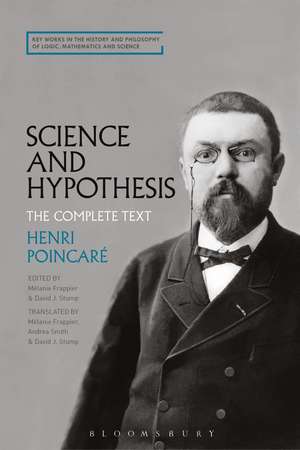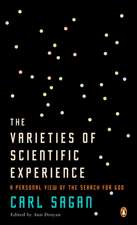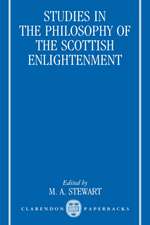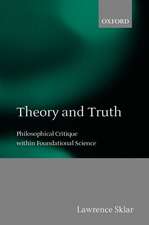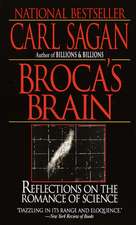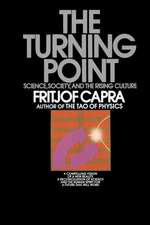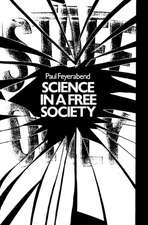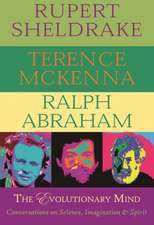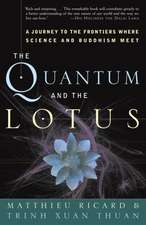Science and Hypothesis: The Complete Text
Autor Henri Poincaré Editat de David J. Stump Traducere de Mélanie Frappier, Andrea Smithen Limba Engleză Paperback – 27 iul 2022
| Toate formatele și edițiile | Preț | Express |
|---|---|---|
| Paperback (1) | 208.91 lei 43-57 zile | |
| Bloomsbury Publishing – 27 iul 2022 | 208.91 lei 43-57 zile | |
| Hardback (1) | 626.18 lei 43-57 zile | |
| Bloomsbury Publishing – 15 noi 2017 | 626.18 lei 43-57 zile |
Preț: 208.91 lei
Nou
Puncte Express: 313
Preț estimativ în valută:
39.98€ • 41.84$ • 33.27£
39.98€ • 41.84$ • 33.27£
Carte tipărită la comandă
Livrare economică 31 martie-14 aprilie
Preluare comenzi: 021 569.72.76
Specificații
ISBN-13: 9781350355576
ISBN-10: 1350355577
Pagini: 208
Dimensiuni: 156 x 234 mm
Greutate: 0.29 kg
Editura: Bloomsbury Publishing
Colecția Bloomsbury Academic
Locul publicării:London, United Kingdom
ISBN-10: 1350355577
Pagini: 208
Dimensiuni: 156 x 234 mm
Greutate: 0.29 kg
Editura: Bloomsbury Publishing
Colecția Bloomsbury Academic
Locul publicării:London, United Kingdom
Caracteristici
Features unpublished material, including a chapter added after Poincare and Einstein's simultaneous publication of the equations forming the basis of Special Relativity
Notă biografică
Henri Poincaré (1854-1912) was a French mathematician, theoretical physicist, and a philosopher of science.David J. Stump is Professor of Philosophy at the University of San Francisco, USA.Melanie Frappier is Associate Professor of Humanities at the University of King's College, Canada.Andrea Smith has a Ph.D. in Romance Languages from UCLA, USA.
Cuprins
1. Introduction by David J. StumpOrigin of the parts of the bookAuthor's PrefacePart I: Number and Magnitude2. On the Nature of Mathematical Reasoning3. Mathematical Magnitude and ExperimentPart II: Space4. Non-Euclidean Geometries5. Space and Geometry6. Experiment and GeometryPart III: Force7. Classical Mechanics8. Relative and Absolute Motion9. Energy and Thermo-DynamicsPart IV: Nature10. Hypotheses in Physics11. The Theories of Modern Physics12. The Calculus of Probabilities13. Optics and Electricity14. XIII Electro-Dynamics15. The End of MatterIndex
Recenzii
Frappier et al. have done an excellent job of bringing back-so to speak-Poincaré's masterpiece of philosophical and scientific thought.
I heartily applaud David Stump, Melanie Frappier and Andrea Smith for this splendid new edition of Poincaré's Science and Hypothesis. By bringing language and terminology up-to-date and providing new insights they have ensured that the book can once again reach the wide audience originally reached by Poincaré. At the same time, they give us a fascinating glimpse into the state of philosophy on the eve of the 20th-century revolutions in mathematical and scientific thought.
Poincaré's essays on science and mathematics retain their importance after over a century because he stood back from the day-to-day tasks to reflect on what it is to do research, the kinds of questions that can be asked, and the kind of answers one might get. This new translation displays the lucidity of his thought, and David Stump's Foreword brings out the depths that lie beneath Poincaré's urbane style. There is new material here, too, and altogether this book is a fresh presentation of Poincaré as an intellectual companion for the twenty-first century.
This updated and corrected translation of Science and Hypothesis is an essential addition to both personal and institutional libraries. Scholars who prefer to read Poincaré in English, as well as general readers of philosophy of science, will appreciate this version, which was produced by a team of three translators/editors. In addition to corrections, the volume includes an additional chapter 14: a paper written in 1906 and added to French editions of 1917, but not included in any prior English translations. Happy reading!
This book is a must-read in the foundations of mathematics and physics. For the beginner, the accurate translation of Poincaré's masterpiece is an excellent introduction to the subject, full of verve and good humor. For the expert, the brilliant foreword gives a lucid account of the major interpretations of Poincaré's work.
This is the edition of Poincaré's Science and Hypothesis English-speaking scholars will henceforth want to use in their teaching and research. The translators have made it more readable without sacrificing accuracy, and their helpful notes, references, and explanations reflect the most recent scholarship on this important philosopher and mathematician.
It was certainly about time a new translation of Poincaré's great classic came out. The translators have done a thorough job comparing first and subsequent editions and updating the language. This volume is to become the definitive English edition of Science and Hypothesis.
Poincare's Science and Hypothesis offers one of the deepest and yet most accessible investigations into the nature of science, constituting one of the most significant works in philosophy of science of the 20th century. This excellent new translation and introduction to Poincare's philosophy offers an invaluable resource for anyone interested in the scientific method and the nature of scientific knowledge.
I heartily applaud David Stump, Melanie Frappier and Andrea Smith for this splendid new edition of Poincaré's Science and Hypothesis. By bringing language and terminology up-to-date and providing new insights they have ensured that the book can once again reach the wide audience originally reached by Poincaré. At the same time, they give us a fascinating glimpse into the state of philosophy on the eve of the 20th-century revolutions in mathematical and scientific thought.
Poincaré's essays on science and mathematics retain their importance after over a century because he stood back from the day-to-day tasks to reflect on what it is to do research, the kinds of questions that can be asked, and the kind of answers one might get. This new translation displays the lucidity of his thought, and David Stump's Foreword brings out the depths that lie beneath Poincaré's urbane style. There is new material here, too, and altogether this book is a fresh presentation of Poincaré as an intellectual companion for the twenty-first century.
This updated and corrected translation of Science and Hypothesis is an essential addition to both personal and institutional libraries. Scholars who prefer to read Poincaré in English, as well as general readers of philosophy of science, will appreciate this version, which was produced by a team of three translators/editors. In addition to corrections, the volume includes an additional chapter 14: a paper written in 1906 and added to French editions of 1917, but not included in any prior English translations. Happy reading!
This book is a must-read in the foundations of mathematics and physics. For the beginner, the accurate translation of Poincaré's masterpiece is an excellent introduction to the subject, full of verve and good humor. For the expert, the brilliant foreword gives a lucid account of the major interpretations of Poincaré's work.
This is the edition of Poincaré's Science and Hypothesis English-speaking scholars will henceforth want to use in their teaching and research. The translators have made it more readable without sacrificing accuracy, and their helpful notes, references, and explanations reflect the most recent scholarship on this important philosopher and mathematician.
It was certainly about time a new translation of Poincaré's great classic came out. The translators have done a thorough job comparing first and subsequent editions and updating the language. This volume is to become the definitive English edition of Science and Hypothesis.
Poincare's Science and Hypothesis offers one of the deepest and yet most accessible investigations into the nature of science, constituting one of the most significant works in philosophy of science of the 20th century. This excellent new translation and introduction to Poincare's philosophy offers an invaluable resource for anyone interested in the scientific method and the nature of scientific knowledge.
